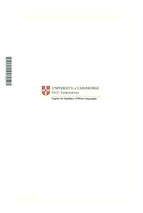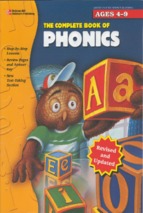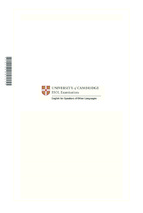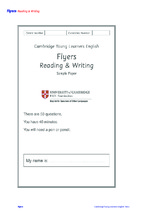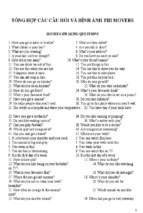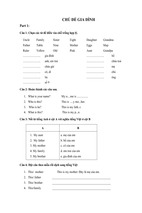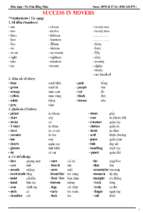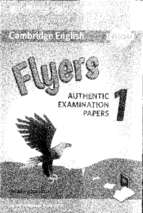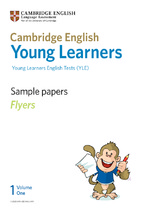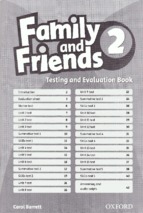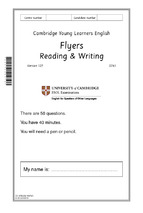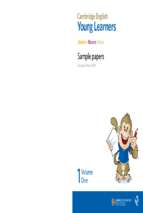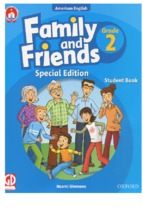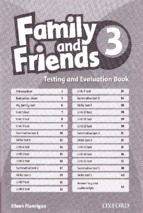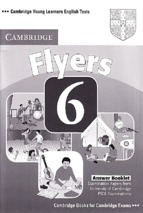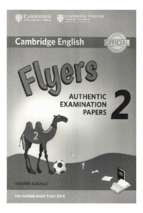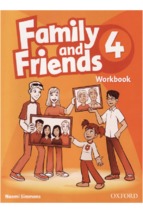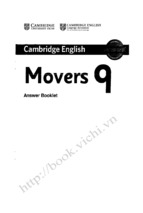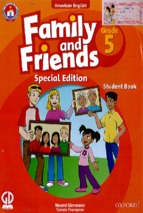A2+
WORKBOOK AUDIO SCRIPT
Starter
Track
01
Page 4, Exercise 5a
Conversation 1
Eva:
Are you ready, Joanna? Hurry up!
Mum’s ready to take us to school.
Joanna: Is it cold outside?
Eva:
Yes, it is! Don’t forget your
sweatshirt.
Joanna: OK, I’ve got it!
Conversation 2
Joanna: Eva, are you wearing trousers or a
skirt to school today?
Eva:
I’m wearing jeans.
Joanna: Jeans?
Eva:
Yes, we’re going on a trip to the
countryside by bus so I want to be
comfortable.
Joanna: Good idea!
Conversation 3
Eva:
Joanna, have you got your
trainers? We’ve got tennis club
after school.
Joanna: Oh no! Where are my trainers? I’ve
got my shoes but I can’t find my
trainers.
Eva:
Here they are!
Joanna: Oh, thanks!
Track
02
Page 5, Exercise 2
1 Dad: Mateo, hurry up! You’ve got five
minutes!
Mateo: Oh no – I haven’t got my house
key!
Dad:
There’s a key on the table near
the door.
Mateo: OK thanks! See you later!
2 Filippo: What’s in your lunchbox today?
Mateo: Two cheese sandwiches and an
apple.
Filippo: Have you got any chocolate?
Mateo: No, I haven’t.
3 Mr Andrews: Mateo, you’re ten minutes
late!
Mateo: I’m sorry!
Mr Andrews: Have you got your
homework?
Mateo: Yes, I have. Here it is.
Mr Andrews: Good! Now sit down and
open your book.
Track
03
Page 6, Exercise 4
A
I like listening to music and reading.
I don’t like swimming or cooking.
I’m not in the drama club because I don’t
like acting.
I like languages! I like speaking Spanish.
B
I like swimming and cooking.
I don’t like listening to music or acting, but
I like reading.
I’m not good at languages and I don’t like
speaking Spanish ... or French!
C
I like swimming and listening to music.
I don’t like reading and I don’t like speaking
Spanish.
I like acting, but I don’t like cooking.
Unit 1
Track
04
Page 12, Exercises 3, 4 and 6
Conversation 1
Carrie: Hey Nick, do you know how this
works?
Nick: Sure, Carrie, what’s going on?
Carrie: I’m just not sure how to view the
pictures I’ve taken.
Nick: Oh yeah ... you want to access the
view album button right here, and
then just press the arrows here to
go back or forward.
Carrie: Brilliant! Thanks a lot.
Nick: No worries.
Conversation 2
Dan: Oh, Zara ... can you help us with
this a minute?
Zara: What’s wrong, Dan?
Dan: We want to watch this video file
Jack has – but on a bigger screen.
I need to plug in my speakers …
where’s the USB port on this thing?
Zara: Oh I see ... it’s usually ... just look,
it’s at the side here.
Dan: Oh yes, I see it now. Great!
Conversation 3
Anna: Oh no … Barney, help!
Barney: What is it, Anna?
Anna: I can’t remember how to save a
new number. Do you know how?
Barney: Sure, just a moment ... Open the
menu ... and then you enter the
number here. And it pops up on the
screen.
Anna: Oh, thanks ...
Track
05
Page 15, Exercise 2
Annie: What do you think about this new
e-reader, Nick?
Nick: I think it’s very useful. It’s small and
it isn’t heavy. You can use it to read
books on the train.
Annie: I agree. I think it’s very useful
because you don’t need lots of heavy
books. But look at this wrist camera;
This page has been downloaded from www.macmillanbeyond.com
© Macmillan Publishers Limited 2014. This sheet may be photocopied and used within the class.
that’s a really creative idea. You can
take pictures anywhere!
Nick: I’d love to have one, but don’t you
think it’s expensive? It costs a lot of
money!
Annie: I don’t know. What do you think
about this house robot? I don’t think
it’s very interesting. It’s so ugly.
Nick: Oh, I disagree. I think it’s cool. I hate
housework!
Annie: And look at this computer pet … now
that’s really silly! Who wants that?
Nick: Oh … yeah, I see what you mean
… kind of stupid really. But here’s
something that’s really creative. You
can see people and images in 3D. It
looks like they’re real!
Annie: Yes, that’s really amazing.
Track
06
Page 15, Exercise 4b
words with /æ/: calculator, calendar,
camera, laptop, maps, tablet
words with no /æ/: compass, games, mail,
messages
Unit 2
Track
07
Page 24, Exercises 2–5
Carl: Hi Anna!
Anna: Hi Carl! Great to see you! This is my
friend, Josh.
Josh: Nice to meet you.
Carl: You too!
Anna: What’s up, Carl?
Carl: Well, I got a good grade in my French
exam, and now I’m going to the
cinema with friends!
Anna: Good for you!
Josh: Well done! Are you doing something
special to celebrate after the
cinema?
Carl: Not really, I’m going to guitar class.
Josh: Really? Do you like playing the
guitar? Can you play well? I play the
saxophone.
Anna: He can’t play well yet, believe me!
That’s why he’s taking classes.
Carl: It’s true!
Josh: OK, OK.
Carl: What are you doing later? My class
finishes at 6 o’clock.
Anna: Josh and I are going ice skating in
the park at 7.00. We love skating.
Carl: Oh, me too!
Josh: Do you want to come with us?
Carl: Sounds like fun! See you there.
Anna & Josh: Great!
Anna: See you at the park at 7.00 then.
1
A2+
WORKBOOK AUDIO SCRIPT
Track
08
Page 26, Exercise 4
Fiona: What are you doing tomorrow
evening? Do you want to go to the
cinema?
Mario: Sorry, I can’t. I’m meeting some
friends.
Fiona: Oh, what a shame! I’m going to
the cinema with Tony. We’re going
shopping after the film. It’s Marta’s
birthday and we’re buying her a
present.
Mario: I can meet my friends early. Then I
can go shopping with you and Tony
later!
Fiona: Perfect! Tony’s coming to the
cinema at 5pm. We can meet at
7pm at the shopping centre.
Mario: Sounds great! See you then!
Track
09
Page 27, Exercise 4
Woman: Woodland Community Centre. Can
I help you?
Brad: Hello. I’m calling about swimming
classes.
Woman: Hang on ... There are swimming
classes on Tuesdays and on
Thursdays.
Brad: What time are the classes?
Woman: At 3pm or 6pm.
Brad: Can I sign up for the 6pm class?
Woman: The 6pm class is full. You can
leave your name and number if
you want.
Brad: OK. My name’s Brad Stinston.
Woman: Can you say that again, please?
Simpson?
Brad: No, Stinston. S-T-I-N-S-T-O-N.
Woman: Right. What’s your telephone
number?
Brad: 733 8025.
Woman: Perfect. We’re starting more
classes in the summer.
Brad: Oh, OK. Thank you very much!
Track
10
Page 27, Exercise 5
1 knee 2 knife 3 know 4 castle
5 sandwich 6 wrong 7 sign 8 listen
9 autumn 10 interesting 11 half
12 Wednesday
Unit 3
Track
11
Page 36, Exercises 3 and 4
Conversation 1
A: We saw some fantastic wildlife when we
were in Kenya last month.
B: Oh yeah? What kind of animals did you
see?
A: We saw a group of elephants – a whole
herd of them!
B: That’s amazing!
A: They came up behind the hotel and
started eating fruit from the trees in the
garden.
B: How many of them were there?
A: Oh …. about five! It was great! I took
some great photos – and I put them on
my bedroom wall.
B: I love elephants. They live for a long time,
don’t they?
A: Yes – some can live up to 60 or 70
years!
Conversation 2
A: Did you take a lot of photos on your trip
to Canada last summer?
B: Yes, I did, but I lost my camera …
A: How did you lose it? Did you drop it
somewhere?
B: No, a grizzly bear took it.
A: Oh no! Really? What happened?
A: We went camping in the mountains and
stayed overnight next to a river.
B: Did the bears come into your tent?
A: Yes, so we ran away behind some trees.
They went into our tents but they didn’t
stay long. When we got back, our bags
were gone – with all our food and, of
course, my camera as well … I was so
upset!
B: I wonder – did they eat all your food?
What kind of food do grizzly bears like to
eat?
A: They eat fruit, meat, fish – anything
really…especially during the summer.
Then they sleep a lot during the winter.
Conversation 3
A: A scary thing happened on our holiday
in Florida this winter.
B: Oh yes? Really – what happened?
A: We found a huge snake in our kitchen.
B: Oh no!
A: I guess it wanted some lunch. When I
looked into the kitchen, it was just sitting
there behind the fridge.
This page has been downloaded from www.macmillanbeyond.com
© Macmillan Publishers Limited 2014. This sheet may be photocopied and used within the class.
B: What did you do?
A: I was so afraid I called the police! And
they called the animal rescue patrol.
B: That was close – are those snakes
poisonous?
A: Yes! Apparently there are thousands of
wild snakes in Florida. Some say there
are about 150,000 snakes there. It’s
because there are no animals that eat
snakes, so the population is increasing
all the time.
Track
12
Page 39, Exercises 1 and 2
Diane: What shall we do to improve our
environment at school? Let’s
choose one of these ideas.
Linda: OK. How about telling everyone to
recycle more plastic and paper?
We have lots of recycling bins in
school, but no-one uses them.
Ian:
That’s a nice idea. We could make
signs and posters.
Diane: That’s not very exciting. Let’s raise
money to help the local animal
shelter.
Ian:
What could we do? What about
having a disco or a fancy dress
party?
Linda: I like the No Plastic Bottle Day.
Everyone who buys a plastic bottle
has to pay a fine.
Diane: I don’t know – that’s a bit serious.
I like the once-a-week veggie day.
That means you don’t eat any meat,
and it’s healthy to eat vegetables
anyway.
Ian:
How does that help the
environment?
Diane: It saves animals of course!
Linda: OK. Why don’t we write a letter
to the school cafeteria and get
everyone to sign it?
Diane: That’s a great idea!
Track
13
Page 39, Exercise 5
1 started, walked, got
2 taught, won, told
3 stopped, thought, was
4 said, began, saw
2
A2+
WORKBOOK AUDIO SCRIPT
Unit 4
Track
Track
Page 51, Exercises 2 and 3
Tomas: Good evening, Pizza Palace, this
is Tomas speaking. Hang on a
moment, please. Sorry, how can I
help you?
Maria: Yes, hello. I’d like to place a
takeaway order, please.
Tomas: Where are you calling from?
Maria: I’m calling from Ipanema.
Tomas: Sure, of course. What would you
like?
Maria: Well, let’s see. Have you got any
salads?
Tomas: Yes, of course. We’ve got the Tomato
salad and our Chef’s Salad.
Maria: Um, I’ll have the Chef’s Salad.
Tomas: OK. Would you like some chicken
on your salad?
Maria: No thanks, I’m a vegetarian.
Tomas: OK, so that’s one Chef’s Salad, no
chicken.
Maria: Exactly.
Tomas: Your order includes free chips or
some bread. What would you like?
Maria: I’m allergic to flour so I’d rather
have chips, please.
Tomas: Perfect. Anything else?
Maria: No, that’s it, thank you.
Tomas: OK. What’s your name and
address?
Maria: It’s Maria. I live at 13 Copacabana
Road, Ipanema.
Tomas: Sorry. Can you repeat your address,
please?
Maria: 13 Copacabana Road.
Tomas: Thank you. That will be …
14
Page 48, Exercises 3, 4 and 5b
Interviewer: Good afternoon and welcome.
It’s 2 o’clock. Today’s show is
called Waste Not, Want Not. On
today’s programme we’re talking
to Martin Ramsey who, believe it
or not, is building his new home
out of recycled materials. We’re
asking him a few questions about
his project and later we will see
if people think it’s a good idea.
Welcome to the show, Martin!
Martin: Thanks, it’s nice to be here.
Interviewer: So Martin, why are you
building your home out of, well,
rubbish?
Martin: I think recycling is so important.
In the UK alone, at least 50% of
our rubbish can be recycled, but a
lot of people don’t take recycling
seriously.
Interviewer: That’s true. According to an
article in the newspaper last week,
75% of people think that recycling
is too complicated, and so they
don’t recycle as much as they
should.
Martin: In my opinion, people make a lot
of excuses not to recycle. It’s wrong
to throw things in the rubbish when
we can use them again. That’s why
I’m building furniture, and other
parts of my house, out of recycled
bottles and cans.
Interviewer: Wow! That must be a lot of
work!
Martin: It’s not always easy, but I think it’s
fun! I love the challenge.
Interviewer: Fun?
Martin: Yes, friends and neighbours often
come to my home with bags full
of materials so I can continue
building. The local school brought
me 1,000 plastic bottles last
month. I cut them into pieces
and used them to make a strong,
colourful wall in my bathroom.
They’re waterproof too!
Interviewer: 1,000 bottles!
Martin: That’s nothing! To make the kitchen
table and chairs I need over 5,000
cans!
Interviewer: Incredible! Well, Martin, many
thanks for joining us. Let’s see what
listeners think about your original
idea …
Track
15
16
Page 51, Exercise 5
Sarah: Let’s stop and get something to eat
while we look for Marco’s house.
Nick: Good idea!
Man: Hello there. Can I help you?
Nick: Let me see. I’d like an egg and salad
sandwich.
Sarah: Can I have the same but with no
lettuce, please?
Man: Of course. Would you like some cold
drinks?
Nick: Do you have any cola?
Man: No, sorry. I’ve got cartons of juice or
bottles of water.
Sarah: I’d rather have tea, actually.
Nick: One bottle of water and one cup of
tea, please.
Man: OK, that’s €7.70.
Sarah: Thank you. Oh, and can you tell us
where Marigold Avenue is?
Man: Sorry? Marigrove Avenue? Could you
say that again, please?
This page has been downloaded from www.macmillanbeyond.com
© Macmillan Publishers Limited 2014. This sheet may be photocopied and used within the class.
Sarah: Marigold Avenue – M-A-R-I-G-O-L-D.
Man: Ah, yes. It’s just around the corner.
Nick and Sarah: Thank you!
Track
17
Page 51, Exercise 6
1 a
2 a
3 a
4 a
5 a
bottle of milk
packet of pasta
carton of milk
box of chocolates
loaf of bread
Unit 5
Track
18
Page 60, Exercises 2, 3 and 4
1
Interviewer: Shiuli, what do you think this
proverb means?
Shiuli: Home is where the heart is? Well,
I think … um … well, it means that
home is where your family lives. For
example, I was born in India, but I
moved to Germany when I was three
and Germany is really my home
now. All my brothers and sisters and
my mother and father are all here,
and, well, this is where my home is
now – with my family.
2
Interviewer: Soraya, what do you think this
proverb means?
Soraya: I think it means that your home is
basically, you know, the people and
culture that you feel comfortable
with. You know, like … now I live in
London because I’m studying at
university here. But I was born in
Lebanon and all my friends and
family still live there – and I really
miss my home. So when I go back
to Lebanon … Well, it just feels
right – the people, the place and the
culture … That’s home.
3
Interviewer: What does this proverb mean
to you, Stefan?
Stefan: Um … well, I’m not sure but I think
that it means … er … that if you’re
happy in a place, that’s your home.
Home is not a place really – it’s a
feeling. I’m originally from Poland,
but I live in Australia now. I speak
Polish and English and … well, and
I really like it here, but I think that
in the future I want to travel, like to
Japan, for example. So as long as I
feel happy, it doesn’t matter where I
am!
3
A2+
WORKBOOK AUDIO SCRIPT
4
Interviewer: What does this proverb mean
to you, Angie?
Angie: I think this proverb means that
home is when you’re with the person
that you love. It doesn’t matter
where you are – you can be in any …
ah … in any country or any city, but
as long as you are with that person,
then you feel happy. Like, my family
is from Switzerland, but now I live
in the USA because I came here to
be with my boyfriend and, uh, this is
really my home now.
Track
19
Page 63, Exercise 1
Conversation 1
Matt: What’s wrong?
Sally: My maths homework is so difficult.
I’ll never get it done!
Matt: Don’t worry. I’ve got this great new
book. It explains everything in really
easy steps. Shall I lend it to you?
Sally: That would be great! Thanks so
much!
Matt: No problem.
Conversation 2
Katie: What’s wrong?
Rob: I’ve got a music exam tomorrow and
I’m so nervous!
Katie: I can practise with you if you like. I’ll
pretend to be the examiner.
Rob: Oh, that’s a great idea. That’s really
nice of you.
Katie: I know!
Track
20
Page 63, Exercise 2
Conversation 1
Matt: What’s wrong?
Sally: My maths homework is so difficult.
I’ll never get it done!
Matt: Don’t worry. I’ve got this great new
book. It explains everything in really
easy steps. I’ll lend it to you!
Sally: That would be great! Thanks a lot!
Matt: No problem.
Conversation 2
Katie: What’s wrong?
Rob: I’ve got a music exam tomorrow and
I’m so nervous!
Katie: Shall I practise with you? I’ll pretend
to be the examiner.
Rob: Oh, that’s a great idea. That’s really
kind of you.
Katie: I know!
Track
21
Page 63, Exercise 4
Pronunciation
Arabic
Polish
Brazilian
Portuguese
Italian
Russian
Japanese
Spanish
Mexican
Swedish
Unit 6
Track
22
Page 72, Exercises 1 and 3
Carlos: Hi Alison! What are you doing here?
I didn’t know you go to this gym!
You know I work here, right?
Alison: Hey Carlos! Nice to see you! Um …
no, I had no idea about that. It’s my
first day here! Um … I’m not really
sure how to use any of this gym
equipment though …
Carlos: Well, you should warm up first. Start
slowly and stretch before you do
any exercise if you don’t want to get
injuries.
Alison: Sounds good! What should I do
first?
Carlos: First stand up straight and stretch
your arms above your head.
Alison: Like this?
Carlos: Yes! Point to the ceiling. OK, good
job. Relax! Now look up, look down.
Look up, look down. Good. That’s
right!
Alison: This is fun! What’s next?
Carlos: Next slowly turn your head from
side to side. Like this – one, two,
three, four. Now stretch your arms
in front of you. Then stretch your
fingers. Now touch your toes. Slowly,
slowly! Be careful. Good, that’s right,
Alison! Finally sit down on the floor
and stretch your legs in front of you.
That’s it! OK, ready to start now?
Alison: We’re starting now? I’m tired
already!
Track
23
Page 72, Exercise 4
1 First stand up straight and stretch your
arms above your head.
2 Point to the ceiling.
3 Look up, look down.
4 Next slowly turn your head from side
to side.
5 Now touch your toes.
6 Finally sit down on the floor.
This page has been downloaded from www.macmillanbeyond.com
© Macmillan Publishers Limited 2014. This sheet may be photocopied and used within the class.
Track
24
Page 75, Exercise 2a
Dad: What’s wrong, Megan?
Megan:I feel terrible, Dad! I’ve got a
stomach ache, my head hurts and
I’ve got a sore throat.
Dad: Oh dear, that sounds terrible! Poor
you!
Megan:What should I do?
Dad: Well, first you should take an
aspirin.
Megan:Then should I go back to bed
maybe?
Dad: No, I think you should probably
get dressed, have your breakfast
and get off to school. You have a
geography exam today, don’t you?
Track
25
Page 75, Exercise 5
1 I think you should go home and rest.
2 Should I go back to bed?
3 First you should take an aspirin.
4 I’ve got a stomach ache and a sore
throat.
5 I’m afraid I feel terrible!
6 If you take some medicine, you’ll feel
better.
Track
26
Page 77, Exercise 1
Mark: Maria?
Maria: Yeah, Mark - what is it?
Mark: I know I’m sometimes a pain, but
I really need my big sister’s help.
Please, will you help me?
Maria: Oh. Sure, Mark. What’s up?
Mark: I’ve got to give this speech at the
school awards ceremony and I
wanted to practise it first. Can you
listen and tell me what you think?
It’s about Toby.
Maria: Of course I will. Do you want to try it
now? Don’t worry - I’m sure it’s very
good.
Mark: It has to be.
Maria: OK, Mark. Go ahead.
Mark: Em … er … OK …
Em … Toby was a happy, popular
student without any real worries or
problems. He was top of his class
in every subject and really good
at sports too. And I guess we all
wanted to like be him.
Maria: Mark, you don’t say why you’re
speaking. You need an introduction.
What’s this for?
Mark: The school’s giving Toby a Special
Achievement award at this year’s
awards ceremony.
4
A2+
WORKBOOK AUDIO SCRIPT
Maria: OK. I understand. Don’t worry. I’ll
help you later. Go on.
Mark: Thanks, Maria. Em … where was
I? But then everything changed.
Toby got Leukaemia. He was really
sick. He lost all his hair and was in
hospital every week.
Maria: Mark?
Mark: Yeah?
Maria: It’s just … you’re reading all the
time. It sounds strange. You need
to use cue cards with just a few
words on them to help you. You’re
speaking slowly and clearly – that’s
really good. But you need to sound
more natural.
Mark: OK.
Maria: This means a lot to you, right?
Mark: Of course.
Maria: OK. Well, don’t worry. Like I said,
I want to help. We just need to
practise more – it’s really good that
you asked me. The thing is, if you
just read, no one will know how
important what you’re saying is. And,
also, you don’t look at the audience
when you read. You need to do
that – look at them – so that they
understand how important this is.
OK?
Mark: Oh! It’s useless. I can’t do it. I’m
so nervous, Maria. Toby’s my best
friend.
Maria: Mark, little brother, I understand.
Come on, now. You can do this. Let
me help you. For Toby, right?
Mark: Right.
Track
27
Page 77, Exercise 2
Mark: Everyone knows Toby and I are
the best of friends, so I am really
happy to be the person who gets to
present him the award for Special
Achievement at this year’s Student
Awards ceremony. But before I give
Toby his award, I want to say a few
words about him and his special
achievement.
A year ago, Toby was a happy,
popular student without any real
worries or problems. He was top of
his class in every subject and really
good at sports too. And I guess we
all wanted to like be him – maybe
some of us were even a bit jealous
of him!
But then everything changed. Toby
got Leukaemia. He was really sick.
He lost all his hair and was in
hospital every week. He felt tired
and weak. He was no longer good
at sports. He was no longer the best
student in class. But, Toby, you were
so brave.
You never lost your smile and you
never stopped trying. You never gave
up. When I visited you in hospital, I
was really scared, Toby. I didn’t want
anything bad to happen to my best
friend. I cried, but you smiled at me
and said, ‘Don’t be sad, Mark – silly!
Everything will be OK. I have the
best friends and family in the world.
I am happy – I’m a lucky boy! Be
happy with me.’
Toby, you are amazing. We miss
you so much at school and we’re
so happy you’re getting better.
You deserve this award more than
anyone, my friend. Please, everyone,
stand up and clap your hands for
Toby Jybaek, the winner of this year’s
award for Special Achievement.
Unit 7
Track
28
Page 84, Exercises 2, 3 and 4
Interviewer: Sandy, can you tell us about
your new website?
Sandy: Yes! I started my website about a
year ago. It’s called BizzyTeens and
it’s for teens who want to create
their own businesses. I started
my first company when I was 14,
selling comics online. After that I
used the money to start other online
businesses. And then other teens
starting asking me for help, so I
started a website that gives advice
to teenagers about how to start up
a business.
Interviewer: And is it successful?
Sandy: Yes, last year we had over 5,000
visitors. It’s all free. I make videos
and run online classes showing
teenagers how to get started in
business. And they can also post
videos and comments on the
website, and tell other people about
their business ideas.
Interviewer: So what advice do you give to
teenagers starting out?
Sandy: Well, you have to read a lot, work
hard and do a lot of research. First,
you have to find a gap in the market
– something that doesn’t exist
already. And you have to find out
what kinds of things teenagers want
to buy. But I think that teenagers
are the best people to find that out.
They don’t need adults telling them
what they want! So my advice is:
This page has been downloaded from www.macmillanbeyond.com
© Macmillan Publishers Limited 2014. This sheet may be photocopied and used within the class.
believe in yourself! You shouldn’t be
worried about having big dreams!
Interviewer: So what are your career plans
now?
Sandy: I want to go to university to get
some qualifications. Then my goal
is to travel around the world and
organise meet-ups for BizzyTeens
users. I want to meet all the people
from my website so we can share
ideas about changing the world!
Track
29
Page 87, Exercise 2
Conversation A
Lisa:
Hi Max, what happened to you
yesterday?
Max:
Hey Lisa! What do you mean?
Lisa:
You promised to meet me at the
coffee shop!
Max:
I promised to … Oh, I’m sorry, Lisa.
I completely forgot.
Lisa:
Oh … don’t worry about it. I met
another friend and had coffee with
her instead.
Conversation B
Tim:
Hi Barbara. You know that book I
borrowed from you?
Barbara: Yes?
Tim:
I’m terribly sorry, but I’ve lost it.
Barbara: You’ve lost it?
Tim:
Yes, I’ll buy you a new one …
Barbara: That’s it! I’m never going to lend
you anything ever again.
Conversation C
Fiona: Tony, why didn’t you phone me
yesterday?
Tony:
Er … phone you … ? Was I … ?
Fiona: Yes, you promised to phone me.
Tony:
Oh … er … I tried to phone but
there was no answer …
Fiona: Oh yes? Well, that’s not good
enough!
Track
30
Page 87, Exercise 4a
1
A: I’m sorry I was late for class this
morning.
B: That’s all right. What happened? Did you
oversleep?
A: Yes, I did.
2
A: Sorry I didn’t phone you yesterday. I
completely forgot.
B: Really? I was waiting for you …
A: I won’t do it again – I promise!
3
A: I’m really sorry about your mobile!
B: What do you mean? Have you lost it?
A: Well … I left it on the bus.
5
A2+
WORKBOOK AUDIO SCRIPT
Track
31
Page 87, Exercise 5
1 start
2 free
3 travel
4 special
5 qualification
Unit 8
Track
32
Page 96, Exercises 3 and 4
Teacher: Has anyone ever listened to a
podcast?
Emma: Yes, I have! I’ve downloaded them
onto my MP3 player.
Teacher: Great! And what do you listen to,
Emma?
Emma: I listen to a weekly podcast on
news stories from around the
world and I’ve also used language
podcasts to improve my Spanish.
Teacher: Really? What a good idea!
Emma: Yeah, I think using podcasts has
really helped my pronunciation.
Teacher: Great! Anyone else? Yes, Hasana?
Hasana: Well, even though I love basketball,
I don’t often listen to podcasts
about sport because you can hear
sports news live on the radio, and I
love to listen to the 6 o’clock report
every day. I only download sports
podcasts on Fridays, because
basketball practice is on from 6.00
to 8.00, so I miss the sports report.
Teacher: But have you listened to other
podcasts?
Hasana: Sure! I’ve listened to history
podcasts, like documentaries about
World War I – I love history!
Teacher: Excellent, Hasana! I’m pleased
you and Emma have both used
podcasts! Anyone else? Yes, Ryan?
Ryan: Uh, well, there’s a film website
that I like. I download podcasts
from there about science fiction
and adventure films – film reviews
basically. And ... uh ... there’s
another site I like which has
podcasts of comedy programmes
with funny stories and jokes.
Teacher: That sounds great, Ryan! So there
are podcasts for everyone, whatever
you are interested in! Personally, I
download podcasts about …
Track
33
Page 99, Exercise 2
Erik: Hi Amina. We’re talking about that
chat show, Speak Out! Did you see it
last night?
Amina: Ugh, yes, I did.
Erik: What did you think of it?
Amina: I thought it was terrible, actually!
I totally disagree with that teacher
on the programme. I don’t think
students today are lazy.
Erik: Well, I agree with him! A lot of
students in our class never do their
homework …
Josh: Oh, I think you’re wrong, Erik! I know
what you mean – there are a few
students who don’t care, but what
about everyone else?
Amina: Josh is right. In my opinion there
are good students and bad ones, but
we aren’t all bad!
Josh: Exactly. He can’t say we’re all lazy.
That’s not fair!
Track
34
Page 99, Exercise 4
A: What did you think of that English
lesson?
B: It was so boring. I nearly fell asleep.
A: I totally disagree. I thought it was the
best English lesson we’ve had this term!
B: You’re wrong. I didn’t like the book
we read. It isn’t very interesting for
teenagers.
A: I know what you mean. Most teens don’t
like stories about history, but I do!
B: Yes, well … I don’t!
Track
35
Page 99, Exercise 5
1 watch
2 chat
3 comedy
4 which
5 show
6 cartoon
7 much
8 chair
Unit 9
Track
36
Page 108, Exercises 4 and 5
Interviewer: Good morning! Today we are
talking to Tania Phillips, who was the
youngest woman ever to play in the
International Tennis Championships
when she was 13 years old. Hi Tania
… thanks for talking to us.
Tania: Thank you. It’s great to be here.
Interviewer: So, this is your second time in
the final – an amazing achievement.
And you’re still only 16! How do
you feel about going into the final
against the world number 1, Maria
Sharp?
Tania: Oh, I try not to feel … I’m not
worried about it, you know? It’s a
challenge to play the best player in
the world, but – you know – I have
nothing to lose really … so I’ll give it
my best.
This page has been downloaded from www.macmillanbeyond.com
© Macmillan Publishers Limited 2014. This sheet may be photocopied and used within the class.
Interviewer: Your last match was a bit
disappointing, wasn’t it?
Tania: Yes, well, you know, I was a bit
depressed about it. But, you know, I
was really tired. It was a late match
and I wasn’t playing my best. But
now I feel better, not so tired. I’m
fairly confident and relaxed about it,
you know …
Interviewer: That’s terrific. Well, we’re all
very excited about seeing you
play tomorrow. I’m sure it’ll be an
amazing match. Good luck!
Track
37
Page 111, Exercise 3
1 You did a great job!
2 You were amazing!
3 Well done!
4 I know how you feel.
5 Bad luck
6 Better luck next time
7 Never mind
Track
38
Page 111, Exercise 4
Conversation A
A: That was an amazing match. You did a
great job!
B: Thank you! It wasn’t easy.
A: I know. The other side had a really strong
team. But your team played the best. You
deserved to win.
Conversation B
A: Hi, what’s happened?
B: I lost the chess match again.
A: I know how you feel. Will you try again?
B: I guess so … Yes, I will.
A: Better luck next time, then.
Conversation C
A: Steve, are you OK?
B: Not really. I sprained my ankle and I
can’t play in the game tomorrow.
A: Oh, bad luck. You’ll get better soon.
B: I hope so.
Track
39
Page 111, Exercise 7
1 interesting
2 exciting
3 boring
4 annoying
5 depressing
6 worrying
7 relaxing
8 tiring
Unit 10
Track
40
Page 120, Exercise 3b
the sand is heated
liquid glass
furnace
blow into the blowpipe
6
A2+
WORKBOOK AUDIO SCRIPT
Track
41
Page 120, Exercises 4 and 5
Interviewer: Sylvano is a glass blower. He
lives on the island of Murano in
Italy. Hi Sylvano, when did you
start glass blowing?
Sylvano: I started when I was only 10!
I always watched my dad, and
sometimes I helped him. He
taught me everything.
Interviewer: Well, you’ve made some
beautiful things. Can you explain
to us how it is done?
Sylvano: Well the glass starts off as sand
– like the sand you find on the
beach. When it is heated to a
really high temperature, it melts
into liquid glass. The liquid glass is
placed on the end of this – I think
it’s called a blowpipe in English
– and then we can make it into
beautiful shapes.
Interviewer: So, you use the blowpipe to
change the shape of the glass – by
blowing air into the pipe?
Sylvano: Yes, that’s right. We have to keep
the glass hot by putting it into the
furnace. That’s the fire that we use
to heat the glass. When it is hot,
it is soft. Then we can create the
beautiful objects.
Interviewer: Yes, they’re amazing. Thank
you, Sylvano. We’ll let you
continue.
Track
Track
43
Page 123, Exercise 5a
1 a
2 a
3 a
4 a
5 a
6 a
ban, b van
discovery, b fishing
climber, b clever
invent, b build
device, b nice
any, b every
Track
44
Page 123, Exercise 5b
1 van
2 discovery
3 clever
4 invent
5 device
6 every
42
Page 123, Exercises 1 and 2
Mina: Hi Eric! Thanks for coming shopping
with me!
Eric: No worries, Mina. What do you need
to buy?
Mina: Well, I need something for my
clothes. I don’t know what they’re
called.
Eric: Do you mean a suitcase?
Mina: No, no no! You use them for drying
clothes, you know, after you’ve
washed them. They’re small and
they’re made from wood or plastic.
Eric: Ah, I know! Some clothes pegs,
right? Like these?
Mina: Yes! Exactly! Perfect, Eric. I’ll take
the plastic ones.
Eric: How much are the clothes pegs,
please?
Shopkeeper: They’re €2.50 for a packet. Is
that all you need?
Mina: Yes, thank you. That’s all.
This page has been downloaded from www.macmillanbeyond.com
© Macmillan Publishers Limited 2014. This sheet may be photocopied and used within the class.
7
- Xem thêm -


